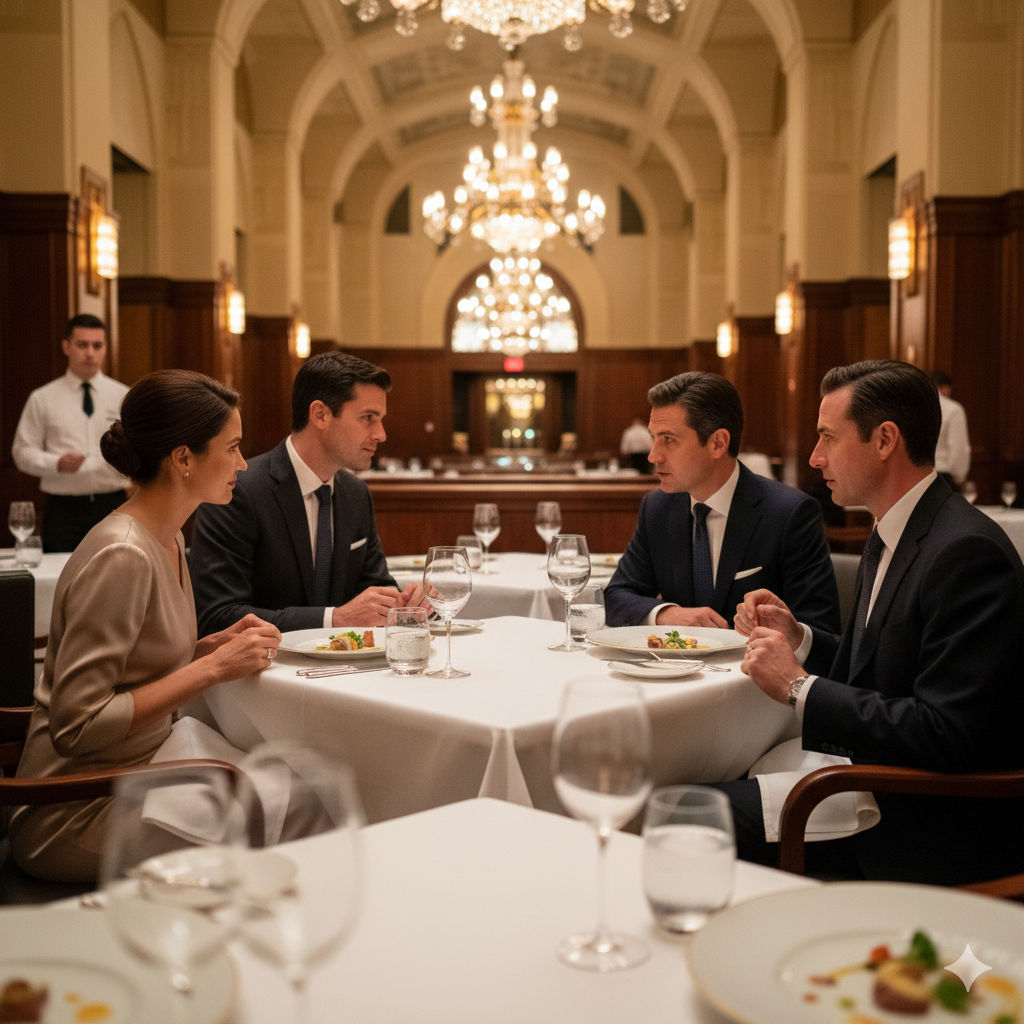When Hospitality Meets Opportunity
Malcolm Gladwell might call it the perfect intersection of preparation and opportunity—what others simply call extraordinary luck. But as we’ll discover, nothing about this encounter was actually left to chance. The success belonged to someone who understood that business happens everywhere, especially in places where defenses are lowered and authentic connections become possible.
The story begins with recognition that Eleven Madison Park represents more than dining—it’s a cathedral of influence where New York’s most powerful figures gather under the guise of experiencing culinary artistry. Smart operators understand that these spaces provide unparalleled access to decision-makers who remain otherwise insulated behind layers of gatekeepers and assistants.
The Science of Serendipity
Our entrepreneur—let’s call him Marcus—had studied the patterns of high-stakes networking with academic precision. He understood that most business conversations fail because they happen in business contexts where everyone expects to be sold something. The secret lies in creating genuine connections in unexpected environments.
Marcus had chosen Eleven Madison Park deliberately. Not for the food, though Daniel Humm’s culinary genius certainly provided conversation starter potential. He chose it because the restaurant’s “unreasonable hospitality” philosophy creates an atmosphere where guards are lowered and authentic human connection becomes possible.
The psychology proves sound. When people invest significant time and money in an experience, they enter what psychologists call a “receptive state”—more open to new ideas and connections than in normal business contexts. The three-hour tasting menu format provides multiple natural conversation opportunities without feeling forced or artificial.
The Perfect Setup
Marcus had done his homework. Through careful research of reservation patterns and social media posts, he identified an evening when several luxury brand executives would likely be dining. The target: Catherine Reynolds, a family office principal with a track record of investing in emerging luxury brands.
The approach required extraordinary finesse. Direct introduction would have appeared transparent and manipulative. Instead, Marcus engineered what appeared to be natural conversation through careful observation and strategic timing.
When Catherine mentioned appreciating the restaurant’s transition to plant-based cuisine during a brief conversation with her sommelier, Marcus found his opening. His own company specialized in sustainable luxury products—a detail he would reveal gradually rather than immediately announcing his business intentions.
The 90-Second Masterpiece
The actual pitch lasted exactly ninety seconds and followed a structure that every entrepreneur should memorize. Marcus opened with genuine appreciation for Catherine’s insight about sustainability in fine dining, immediately establishing common ground and demonstrating that he had been listening rather than waiting to talk.
The next thirty seconds positioned his company not as a business seeking investment, but as a solution to a problem Catherine had mentioned—the difficulty of finding luxury products that align with environmental values without compromising quality or aesthetics.
The middle thirty seconds told a story. Not about products or market opportunities, but about transformation. Marcus described a specific customer who had changed her entire approach to luxury consumption after discovering his brand. The story provided concrete evidence of consumer behavior change while avoiding traditional sales language.
The final thirty seconds delivered what venture capitalists call “the ask” without actually asking for anything. Marcus simply mentioned that his company was “exploring strategic partnerships with investors who understand that luxury’s future lies in conscious consumption” and suggested they continue the conversation in a more appropriate setting.
The Psychology of High-Stakes Persuasion
The pitch succeeded because it respected fundamental principles of high-level persuasion. First, it created intrigue without applying pressure. Catherine found herself genuinely curious about Marcus’s company rather than feeling like she was being sold something.
Second, it positioned Marcus as a peer rather than a supplicant. By demonstrating knowledge of industry trends and speaking Catherine’s language, he established credibility that formal presentations often fail to achieve. The conversation felt like two industry experts discussing mutual interests rather than a funding request.
Third, it provided clear next steps without creating awkwardness. Catherine could express interest or politely decline without either party losing face—a crucial consideration when dealing with influential figures who value their reputations and relationships.
The Art of Reading the Room
Success in these environments requires extraordinary social intelligence. Marcus had observed Catherine throughout the evening, noting her enthusiasm for certain topics, her communication style, and her apparent values. This preparation enabled him to customize his approach in real-time.
He noticed Catherine’s appreciation for the restaurant’s attention to detail and incorporated similar language into his description of his company’s approach to product development. When she mentioned admiring businesses that “do well by doing good,” he positioned his company within that framework rather than focusing on financial returns.
The conversation built naturally because Marcus had identified genuine areas of alignment rather than forcing artificial connections. This authenticity reflects the same principles that made Eleven Madison Park legendary—success comes from genuinely caring about the experience rather than manipulating outcomes.
The Follow-Through Framework
The conversation at Eleven Madison Park represented only the opening movement of a longer symphony. Marcus understood that initial interest meant nothing without flawless execution of subsequent interactions.
He waited precisely three days before sending a follow-up message—long enough to avoid appearing desperate, short enough to maintain momentum. The message referenced specific details from their conversation, demonstrating that he had been fully present during their interaction rather than simply waiting for his turn to pitch.
The business plan Marcus eventually presented had been refined through dozens of previous conversations with other investors. By the time Catherine saw it, every potential objection had been anticipated and addressed. The document read less like a funding request and more like an invitation to participate in an inevitable success story.
The Million-Dollar Details
What transformed initial interest into actual investment was Marcus’s understanding of family office psychology. Unlike venture capitalists focused primarily on financial returns, family offices often seek investments that align with personal values and provide social benefits beyond profit generation.
Marcus positioned his company as addressing both financial opportunity and social impact. The sustainable luxury market was growing rapidly, providing compelling return potential. Simultaneously, the investment would support environmental responsibility and ethical business practices—causes Catherine personally championed.
The numbers told a compelling story, but the narrative provided emotional resonance that pure analytics could not achieve. The most successful luxury brand pitches combine rational analysis with emotional appeal, giving investors logical justification for decisions their instincts already support.
The Network Multiplier Effect
Catherine’s investment represented more than capital infusion. Her endorsement opened doors to additional family office relationships, luxury brand partnerships, and retail distribution opportunities that money alone could not purchase.
Within six months, Marcus’s company had secured partnerships with three additional family offices and launched in twelve luxury retail locations. The Eleven Madison Park conversation had created what business theorists call “network effects”—where initial connections generate additional opportunities at an accelerating pace.
The total investment eventually reached $25 million across multiple funding rounds, but the true value lay in the relationships and credibility that accompanied the capital. Marcus had transformed his company from an unknown startup into a recognized player in the luxury sustainability space.
The Replication Strategy
Success at Eleven Madison Park wasn’t accidental, and it can be replicated by entrepreneurs who understand the underlying principles. The key lies in recognizing that business development happens everywhere—particularly in environments where people don’t expect to be approached about business opportunities.
The most effective luxury networking happens at charitable galas, cultural events, exclusive restaurants, and private clubs where influential figures gather for personal rather than professional reasons. These settings provide access that formal business channels cannot match.
However, success requires genuine interest in the environment and people rather than purely transactional motivations. The most successful networkers like philanthropist Jean Shafiroff succeed because they genuinely care about the causes and communities they support, making business development a natural byproduct rather than the primary objective.
The Modern Art of Influence
Marcus’s success reflects broader changes in how luxury business gets conducted. Traditional approaches—cold calls, formal presentations, conference networking—increasingly fail with sophisticated investors who can afford to be selective about their time and attention.
The future belongs to entrepreneurs who can create authentic connections in authentic environments. This requires investment in relationship-building that may not generate immediate returns but ultimately provides access to opportunities that formal business development cannot achieve.
The Eleven Madison Park pitch succeeded because it felt like a natural conversation between two intelligent people discussing mutual interests. Only in retrospect did it become clear that every element had been carefully planned and executed with professional precision.
The Compound Returns of Relationship Capital
Five years later, Marcus and Catherine maintain both a business relationship and genuine friendship. Her investment has generated substantial returns, and his company has become a recognized leader in sustainable luxury products. More importantly, they’ve collaborated on additional ventures and continue introducing each other to relevant opportunities.
This ongoing relationship illustrates the true value of authentic networking. Unlike transactional interactions that end when deals conclude, genuine connections provide compound returns over decades. The Eleven Madison Park conversation launched not just a business relationship but a mutually beneficial partnership that continues generating value for both parties.
For entrepreneurs seeking to access family office capital or luxury brand partnerships, the lesson is clear: invest in authentic relationship building rather than transactional approaches. Find environments where you can connect with influential figures as a peer rather than a supplicant. And remember that the most valuable conversations often happen between the courses of life’s most memorable meals.
Related Stories:
- How Philanthropic Networking Creates Business Opportunities
- The Art of Building Relationships That Generate Investment Opportunities
Ready to position your luxury brand among decision-makers who matter? Contact Social Life Magazine to explore advertising opportunities and editorial partnerships that connect you with the investors and influencers shaping tomorrow’s luxury market.


